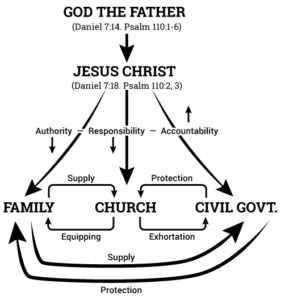What we have discussed the past few weeks is neither easy nor entertaining reading to everyone. It is controversial, theological, and, for many, a brand new way to look at the world and life in general.
everyone. It is controversial, theological, and, for many, a brand new way to look at the world and life in general.
However, I believe understanding clearly the subject of our discussions is worth the effort necessary to make it the object of our diligent pursuit. It is the framework for all of life, both the reason for life’s journey and the means by which we take the trip. It is the name of my blog, The Two Edges of the Sword (of the word of God), and the subject of all its postings. The two edges represent the gospel and the kingdom, grace and law, faith and obedience, cause and effect, and means and results.
The two edges are not synonymous but sequential. First comes gospel, grace, faith, cause and means. Then comes kingdom, law, obedience, effect and results. Most of us prefer one or the other of the two edges, but recognizing and functioning in both properly, according to the Bible, are crucial in experiencing what God plans for man in our relationship with Him.
We have been focusing on the kingdom in our recent postings. Today, I want to present a diagram that pictures practically what “kingdom” means in real life. I call this diagram “The Ship of the Kingdom” because it looks like a sailboat. It gives a biblical view of the ascension of Jesus and shows us how that event positions and empowers us to actively be involved daily in God’s plan to extend His kingdom over the earth.
Everyone agrees that since His ascension Jesus rules from God’s right hand as the King of all other kings and the Lord of all other lords. We have to believe that, because the Bible clearly teaches it all through the New Testament (i.e., Acts 2:33-36, Ephesians 1:20-23, etc.). But what does that mean?
Frankly, it often means very little in our time today. He is in some vague way “ruling” and He is in some vague way our “Lord,” and we generally try to do what a “good Christian person” would do. But, other than that, those terms have little meaning.
However, the kingdom of God, this rule of Jesus Christ, is a lot more specific than that. Jesus was given the kingdom in Daniel 7:14 at the ascension, a kingdom that would last forever and that would never be destroyed. It was then permanently delegated to the “saints of the Most High” in verse 18 and mentioned again in verse 29 and in Psalm 110.
Incredible! Jesus first saves us, as we experience the gospel of His grace; He encourages us as He renews our minds to live more consistently by it; and then, when we are ready, He delegates to us the kingdom—daily responsibilities in our lives over which we rule according to the law of God. We now rule for Him as His representatives today on the earth. We, the corporate people of God, the body of Christ, the church, now possess the kingdom!
The implications of this are staggering. As we recognize the areas where Jesus has delegated responsibility to us, we rule over them with His authority, not our own. We also recognize that we will ultimately be accountable to Him for how we have ruled. Responsibility, authority and accountability are the three concepts by which the kingdom of God advances, and they are represented by the three lines in the diagram flowing from Jesus to us.
We cannot escape the implications of “rule.” All of us are both under authority and exercising it, if we indeed are a part of His kingdom. The very word “kingdom” implies rule, which is a very unpopular concept in today’s culture. Rebels want no one to have authority in their lives. “Ain’t nobody gonna tell me nothin’” is the prevailing attitude in our society.
However, there are three institutions through which Jesus has delegated His rule to man: the family, the church and the civil government. Each of these is ordained by God and His kingdom only comes as authority, responsibility and accountability are operative in each, as the diagram depicts.
The diagram includes only the three institutions formally established by God in the Bible. There are obviously other authority structures where the same principles apply. They include the marketplace, education, the arts, athletics, charity, medicine, education, etc. Wherever we have been given authority and responsibility, God is in the process of extending His rule by His law in that place.
Practically, how does that work today? Many have never asked that question. Even most Christians don’t go to God’s law in the Bible to find specific answers to it, even for the church or the family, and certainly not the civil government. “What in the world does the Bible have to say about politics?,” they ask.
It so happens that it has a lot to say about all three of these functions. The Bible is the “standard for faith and practice,“ the Westminster Confession tells us. Next week we will begin to see just how.

 ram, notice at the top is God the Father, who is seated on His throne as the Ancient of Days as described in Daniel 7:13, 14. The vertical line, flowing from God down to Jesus, is HIs official delegation of the kingdom to Jesus that He had won back for HIs Father at the cross.
ram, notice at the top is God the Father, who is seated on His throne as the Ancient of Days as described in Daniel 7:13, 14. The vertical line, flowing from God down to Jesus, is HIs official delegation of the kingdom to Jesus that He had won back for HIs Father at the cross.